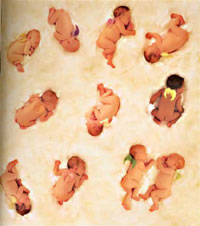 |
|
High number of births in the auspicious Year of the Pig
|
A baby boom is about to hit parts of Asia, as couples try to ensure their newborns get a happy, wealthy life by starting off in the Year of the Pig.
This Chinese lunar new year, which starts on February 18, is believed to be an especially auspicious "golden pig year" which only comes around every 60 years.
South Korea is going a step further, saying it's the best time in 600 years to have a baby due to an anomaly on the Chinese calendar where this pig year -- known as "red," the color of wealth, follows a year with two days to mark the start of spring.
In China, where most families are allowed only one child, baby-related businesses are bracing for an influx of "piglets" .
"The Year of the Pig will certainly be busy. There will be a lot of precious pigs born this year, because of the Chinese superstition that pig babies will have an easy life," said Tian Hua, who manages a nanny sourcing firm in Shanghai.
Tian's firm specializes in caring for mothers and infants during the first month after birth, when Chinese tradition holds that a woman should rest and eat special foods.
Her 200 nannies are booked through July, and the company has raised prices by up to 45 percent, she said. Hospitals in mainland China and Hong Kong are also heavily booked.
In South Korea, which has one of the world's lowest birth rates, the Year of the Pig could herald the bundles of joy that years of government incentives have failed to create.
South Korea has seen a recent rush of expectant mothers atmaternity clinics, keen to have their babies after February 18.
Fortune tellerKang Pan-seok, however, says 2007 is not the super lucky event it's been hyped up to be.
"The government is selling people on the golden pig year in order to have more babies," said Kang, vice director of the Korean Fortune Tellers Association.
"This is just a red pig year, but I don't mind because I have been swamped with customers seeking advice."
But the red or golden debate does not matter to South Korean companies, who are interested in the color of money.
點擊查看更多雙語新聞
(Agencies) |
亞洲部分地區即將掀起一波嬰兒潮。大多數夫婦為給孩子討個好彩頭,都選擇在豬年生寶寶,希望生肖豬能保佑“豬寶寶”一生殷實無憂。
2月18日將迎來中國農歷新年。有說法認為,這一年是60年不遇的“金豬年”,是個難得的吉利年份。
韓國人的說法更“神”,他們說按照中國歷法,象征財富的“紅”豬年緊跟在“雙春年”狗年之后,因此這一年出生的“豬寶寶”最吉利,要600年才能輪上一次。
在中國,大部分家庭只能有一個孩子,因此,為奔金豬而來的“小豬潮”將帶動一系列嬰兒相關產業鏈。
上海一家月嫂公司負責人田華說:“根據民間傳說,屬豬的孩子會生活得很安逸,因此,即將來臨的豬年會非常忙碌,將會有許多重量級小豬寶寶問世。”
田華的公司專門為新生嬰兒和產婦提供產后第一個月的護理。中國人歷來認為,女人在產后第一個月需要好好保養,并要格外注意飲食。
據悉,早在去年7月份、僅僅一個月時間里,田華的公司就有200名月嫂被預訂出去。公司的服務費現已比原來增長了45%。目前,無論是中國大陸還是香港,醫院的產科病房都被產婦訂滿了。
韓國是世界上生育率最低的國家之一,韓國政府采取的促生育措施始終不見成效。不過,金豬年的來臨極大可能改變這一窘境。
在韓國,婦科門診已經出現了一個孕婦高潮,準媽媽們都希望自己的孩子在2月18日后問世。
算命先生Kang Pan-seok說:“2007年并非絕頂地幸運,它被吹得有些離譜了。”
這位韓國算命協會的副會長還說:“政府為了提高生育率就向人們‘推銷’金豬年”。
“今年充其量也就是個‘紅豬年’。不過,正是因為‘紅豬’,來我這兒求簽的顧客才絡繹不絕,所以我并不介意政府的宣傳措施。”
對韓國公司而言,他們才不在乎“紅”“金”之爭呢,他們只在乎能否能盈利。
( 英語點津陳蓓編輯)
|